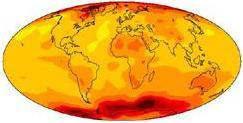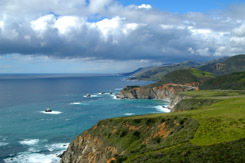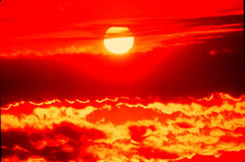
Sometimes little things can turn into big things. Think about brushing your teeth. If you don't brush for one day, chances are nothing bad will happen. But if you don't brush your teeth for one month, you may develop a cavity. It's the same thing with global temperatures. If temperatures rise above normal levels for a few days, it's no big deal – the Earth will stay more or less the same. But if temperatures continue to rise over a longer period of time, then the Earth may experience some problems.
Average global temperature has increased by almost 1ºF over the past century; scientists expect the average global temperature to increase an additional 2 to 6ºF over the next one hundred years. This may not sound like much, but it could change the Earth's climate as never before. At the peak of the last ice age (18,000 years ago), the temperature was only 7ºF colder than it is today, and glaciers covered much of North America!
Earth's Temperature Even a small increase in temperature over a long time can change the climate. When the climate changes, there may be big changes in the things that people depend on. These things include the level of the oceans and the places where we plant crops. They also include the air we breathe and the water we drink.
What Might Happen?
It is important to understand that scientists don't know for sure what climate change will bring. Some changes brought about by climate change will be good. If you live in a very cool climate, warmer temperatures might be welcome. Days and nights could be more comfortable and people in the area may be able to grow different and better crops than they could before. But it is also true that changes in some places will not be very good at all.
Human Health
Climate change may affect people's health both directly and indirectly. For example, heat stress and other heat related health problems are caused directly by very warm temperatures and high humidity. Untreated, heat stress can be a very serious medical problem. Scientists suspect that, in many places, climate change will increase the number of very hot days that occur during the year. More hot days increases the possibility of heat related health problems.
Indirectly, ecological disturbances, air pollution, changes in food and water supplies, and coastal flooding are all examples of possible impacts that might affect human health.
How people and nature adapt to climate change will determine how seriously it impacts human health. Some people and places are likely to be affected more than others. Generally, poor people and poor countries are less likely to have the money and resources they need to cope with preventing and treating health problems. Very young children and the elderly adults will run the highest risks.
Ecological Systems
Climate change may alter the world's habitats and ecosystems – all living things are included in and rely on these places. Many of these places depend on a delicate balance of rainfall, temperature, and soil type. A rapid change in climate could upset this balance and seriously endanger many living things. Most past climate changes occurred slowly, allowing plants and animals to adapt to the new environment or move somewhere else. However, if future climate changes occur as rapidly as some scientists predict, plants and animals may not be able to react quickly enough to survive. The ocean's ecosystems also could be affected for the same reasons.
Sea Level Rise
Surfer Global warming may make the sea level become higher. Why? Well, warmer weather makes glaciers melt. A glacier is a large sheet of ice that moves very, very slowly. Some melting glaciers add more water to the ocean. Warmer temperatures also make water expand. When water expands in the ocean, it takes up more space and the level of the sea rises.

Sea level may rise between several inches and as much as 3 feet during the next century. This will effect both natural systems and manmade structures along coastlines. Coastal flooding could cause saltwater to flow into areas where salt is harmful, threatening plants and animals in those areas. For example, an increase in the salt content of the Delaware and Chesapeake bays is thought to have decreased the number of oysters able to live in those waters.
Oceanfront property would be affected by flooding, and beach erosion could leave structures even more vulnerable to storm waves. Whether we move back from the water or build barricades in the face of a rising sea, it could cost billions of dollars to adapt to such change. Coastal flooding also may reduce the quality of drinking water in coastal areas.
Crops and Food Supply
Global warming may make the Earth warmer in cold places. People living in these places may have a chance to grow crops in new areas. But climate change also might bring droughts to other places where we grow crops. In some parts of the world, people may not have enough to eat because they cannot grow the food that they need.
See Also:
What is Global Warming
What is The Greenhouse Effect
Choosing a Green Vehicle
 Print
Print Email
Email








